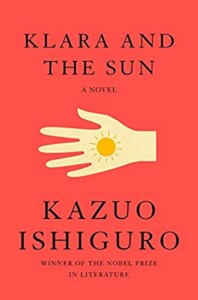Klara and the Sun by Kazuo Ishiguro (2021), 303 pages.
(also available as an ebook on Libby)
Some books explain their setting right away, grounding you, the reader, and placing you explicitly in a certain time and place. Those stories take care to explain what is going on so that you understand fully before anything starts to happen. Klara and the Sun by Kazuo Ishiguro is not such a book. Instead, you begin the story with very little, if any, explicit explanation of where you are, when you are, and what exactly is going on. Indeed, you must sort out this world mostly by context clues, much in the way that the protagonist, Klara, does. We meet Klara, an AF (though what this means is revealed later), in a shop where she is eager to be placed in the display window for as long as possible, in order to directly observe a world that she has otherwise only learned about through magazines. Klara’s story unfolds slowly, with the sense that something significant is always about to be revealed, but without the strong sense of tension that you might feel while reading, say, a thriller. This is a story that has a lot to say about what it means to be human, what our beliefs say about us, and what we owe to each other. It took me a while to get through this quiet work of speculative fiction, but now that I have I can’t quite stop thinking about it.
If you are looking for something similar to Klara and the Sun, I would suggest:
Machines Like Me: And People Like You by Ian McEwan (2019), 333 pages.
Speak by Louisa Hall (2015), 316 pages.
You Will Never Be Forgotten: Stories by Mary South (2020), 244 pages.
Happy reading!
-Teresa Moulton

